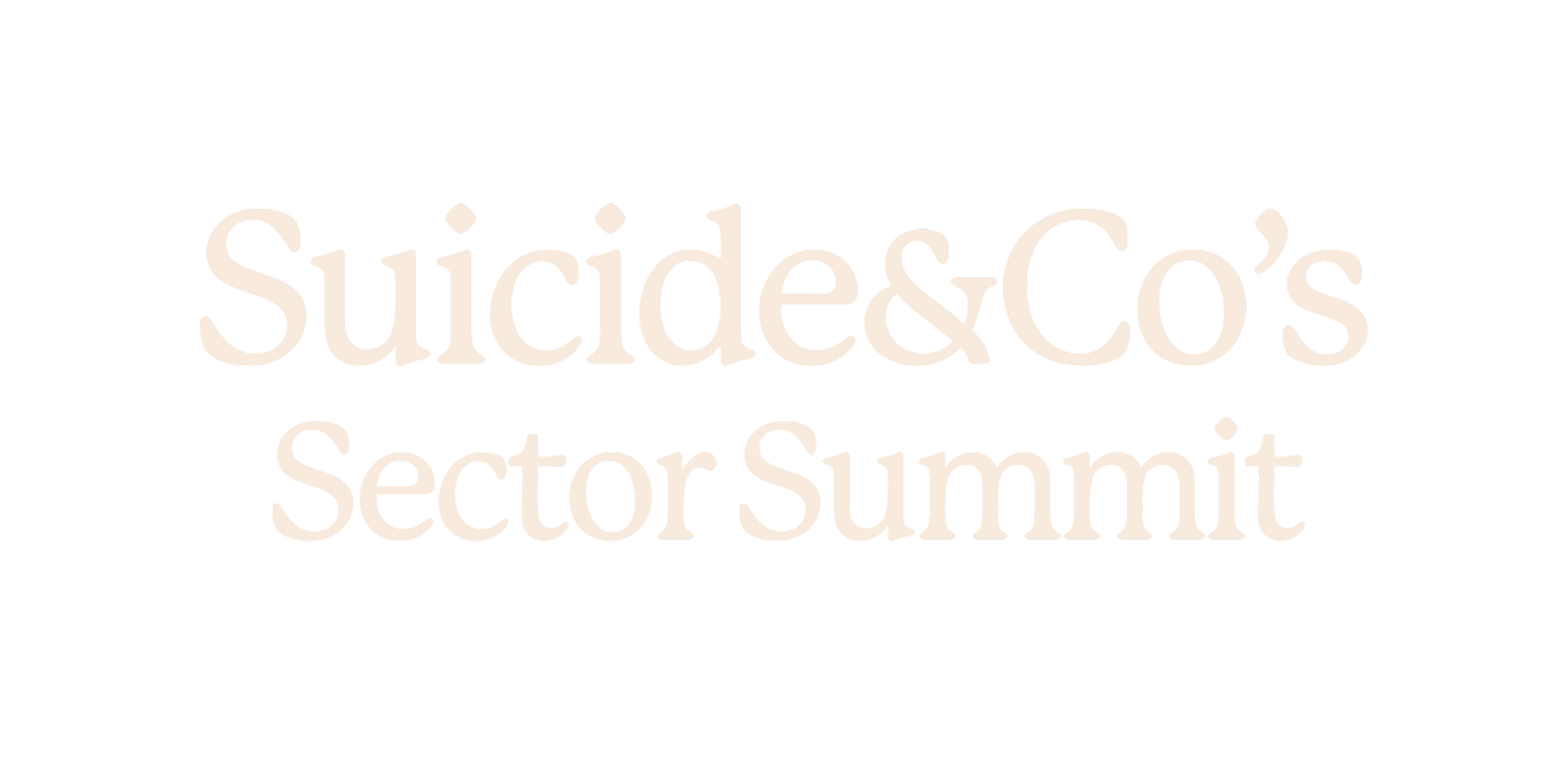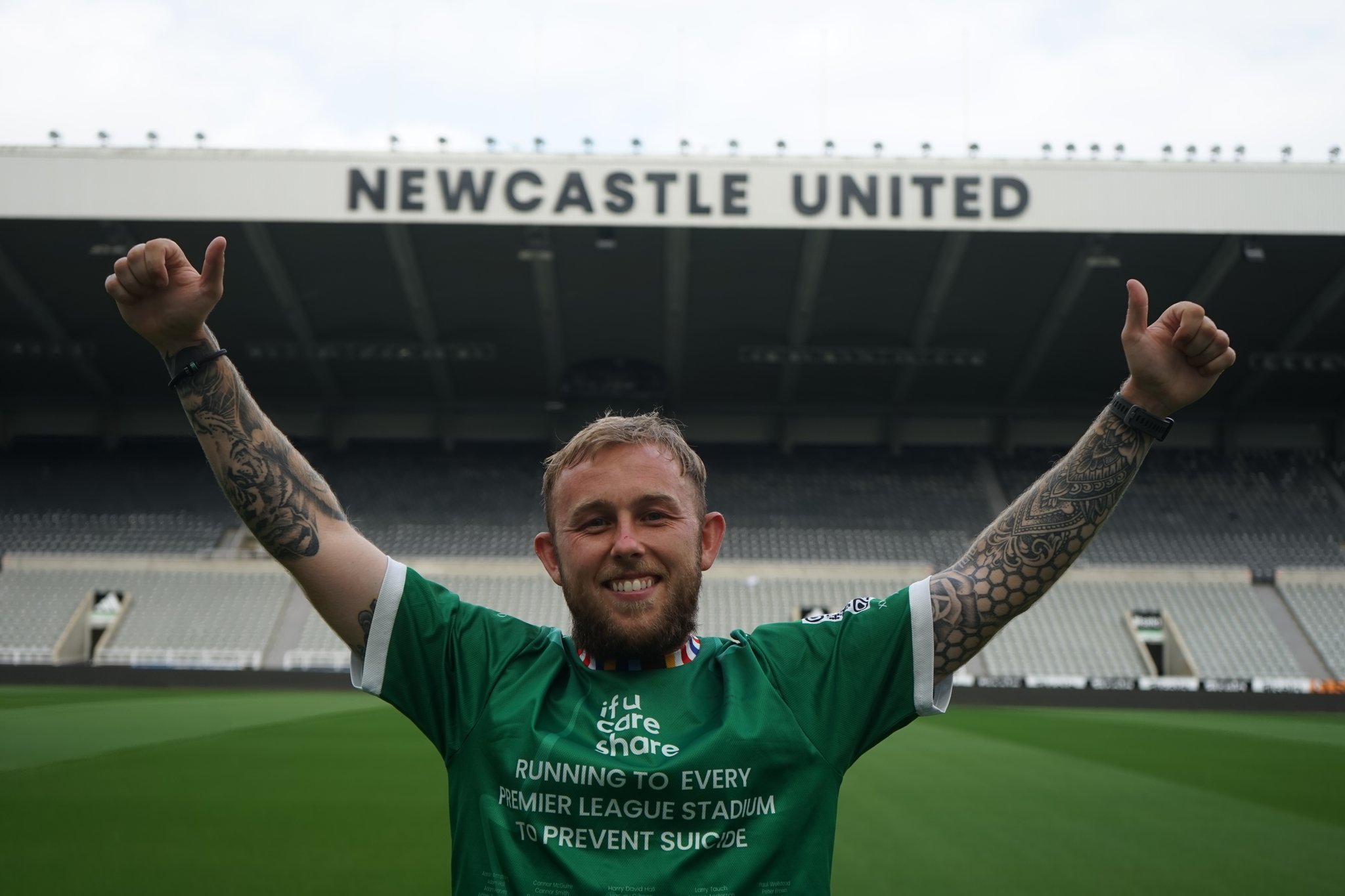
27th February 2025
Join us for an exciting day of knowledge sharing and networking at Church House, Westminster at Suicide&Co's second Sector Summit, a must-attend event for professionals working with individuals bereaved by suicide.
Agenda
8:30 - 9:00 | Registration
9:00 - 9:15 | Welcome | Amelia Wrighton, CEO of Suicide&Co
9:15 - 9:30 | Addressing Masculinity and Access to Support Services
Hári Sewell, Founding Director, HS Consultancy
This keynote will explore the critical relationship between masculinity and access to mental health and support services, focusing on the barriers that prevent men from seeking help. Cultural norms, stigma, and societal expectations around masculinity often discourage men from engaging with the support they need, leaving them at greater risk.
The session will challenge traditional perceptions of masculinity and look to actionable strategies for reshaping services to be more accessible and inclusive for men.
9:30 - 10:15 | Navigating Dominant Factors and High-Risk Audiences
This panel will delve into the complex challenges of supporting individuals affected by suicide, particularly those facing additional barriers like domestic abuse, cultural stigma, or social exclusion. Experts will discuss how these intersecting factors heighten vulnerability and complicate access to mental health and bereavement services. The session will focus on how services can adapt their processes, practices, and outreach to be more inclusive and accessible to diverse, hard-to-reach communities.
Hazel Mercer, Operations Manager, AAFDA
Jake Mills, Founder, Chasing the Stigma
James Ridge, Head of Faith Services, General Chaplain
Matthew Smith, COO, If U Care Share
Rita Hirani, CEO, Mind Out
10:30 - 10:50 | Coffee Break
10:15 - 10:30 | Creating an Evidence-Based Model To Support People Bereaved by Addiction
Fay Kepidou, Training & Support Manager, Addiction Family Support
In this keynote, Addiction Family Support will present their innovative adaptation of the original 5-Step Method, specifically designed to support individuals bereaved by addiction. This adapted model integrates evidence-based practices with a deep understanding of the unique challenges faced by those grieving a loss due to substance use. The session will provide valuable insights into the process of adapting and implementing evidence-based models to enhance service delivery and foster sustainable, positive outcomes for bereaved individuals and their communities.
10:50 - 11:05 | Understanding Suicidal Behaviour: The Integrated Motivational-Volitional Model
Professor Rory O'Connor, Professor of Health Psychology, University of Glasgow
In this keynote, expert Professor Rory O'Connor will walk us through his groundbreaking Integrated Motivational-Volitional (IMV) Model of Suicidal Behaviour. This model provides a comprehensive framework for understanding the complex psychological processes that lead to suicidal thoughts and actions.
It also identifies key motivational and volitional factors that contribute to suicidal thoughts and actions, providing a comprehensive approach to prevention and intervention.
11:05 - 11:50 | The latest developments in research | Prof Jo Smith OBE, Dr Simon Merrywest, Rachel Gibbons
Prof. Jo Smith OBE | Professor of Early Intervention and Psychosis | University of Worcester
Professor Jo Smith has dedicated her working life to tackling mental health problems, particularly in young people and, student suicide in particular. Jo was project lead for 'Suicide Safer' a multiagency student suicide prevention initiative at University of Worcester (2013-2019). She has recently co-authored and edited new guidance: ‘Collective responsibility, collective action to prevent student suicide; Guidance for the higher education sector to reduce risk and restrict access to means of suicide’, funded by Unite Students and Symplicity and published in October 2024.
Dr Simon Merrywest | Director for the Student Experience | The University of Manchester
Dr. Simon Merrywest has been Executive Director for the Student Experience at The University of Manchester since 2017. His team support students through their journey from recruitment to graduation, including the extensive provision of student wellbeing and more specialist support. They also run a large residential and sport portfolio and operate four overseas centres.
Rachel Gibbons | Psychiatrist
Rachel Gibbons is a Consultant Psychiatrist, Medical Psychotherapist, Psychoanalyst and Group Analyst. She has worked in the NHS for the past 20 years. Up until February 2020, she also worked as the National Director of Therapies for the Priory Group. She has been working within the subject of suicide over the last 12 years and is a member of the National Suicide Prevention Advisory Group.
11:05 - 11:50 | Deepening Our Understanding Through Research
This panel will bring together leading researchers in the fields of suicide and grief, and will highlight impactful findings that can inform evidence-based approaches, helping organisations strengthen their policies, services, and strategies. The discussion will focus on how research can bridge the gap between understanding and action, equipping professionals with the knowledge needed to enhance outcomes for those affected by suicide.
Simon Merrywest, Director Student Experience, University of Manchester
Rosie Ellis, Executive Lead, NSPA
Jo Smith OBE, Prof of Early Intervention, University of Worcester
Rachel Gibbons, Psychiatrist, NHS
David Mosse, Professor of Social Anthropology, SOAS
11:50 - 12:05 | Exploring The Experience of Guilt After Suicide Loss
Dr Alexandra Pitman, Clinical Researcher, UCL
In this keynote, Prof. Alexandra Pitman from the UCL Division of Psychiatry will outline the findings of some recent qualitative research into the different dimensions of guilt experienced by adults in the UK who have been bereaved by suicide. She will introduce her research team’s proposed taxonomy of guilt after suicide loss, which categorises its various forms and explores how guilt manifests and affects individuals differently in the aftermath of suicide loss. Prof Pitman’s research provides a crucial framework for understanding and addressing guilt within bereavement support services, providing valuable insights into the emotional complexities of guilt, its psychological repercussions, and the ways it can shape the grieving process for some.
12:05 - 12:15 | Workplace Wellbeing: Insights that Drive Action
Paul McGregor, Founder, Everymind At Work
This keynote will delve into research on workplace wellbeing, emphasizing the critical importance of moving beyond generic approaches to address the specific needs of diverse employee populations. While significant progress has been made in raising awareness and implementing wellbeing initiatives, there remains a pressing need to focus on the details that truly matter to employees. The session will explore how data-driven insights and tailored strategies can bridge the gap between broad wellbeing programs and the tangible outcomes employees seek.
12:15 - 13:15 | Lunch
13:15 - 13:30 | The Power of Partnership and Collaboration
Angela Allen, Bags for Strife
In this keynote, Angela Allen will share the journey of her new charity, Bags for Strife, which provides essential information and resources to individuals bereaved by suicide. Angela will highlight how building strong partnerships with local authorities, charities, and emergency services has been instrumental in the success of her initiative. This session will offer valuable insights into the importance of partnership and collaboration in enhancing the reach and impact, showcasing how collective efforts can create meaningful change.
13:30 - 13:45 | From Frontline to Framework
Ross MacLeod, Water Safety Manager, RNLI
In this keynote, we will hear about the journey the RNLI is on from being on the frontline of suicide response to developing a comprehensive strategy for suicide prevention and postvention. Drawing on years of experience and data gathered while supporting individuals in crisis, the RNLI is now defining their role within the sector and formalizing their approach. This session will also cover how an operational organisation transforms its lived experience into processes and the lessons learned along the way.
13:45 - 14:30 | Panel Discussion: Upholding Boundaries to Maximise Impact
This panel will explore the nuanced role of boundaries within service delivery, challenging the perception that they are inherently exclusionary. Experts will share insights and real-world examples of how setting clear and intentional boundaries can enhance service effectiveness, focus resources, and deliver meaningful support to those who need it most. The discussion will highlight how defining service scope and understanding target populations can amplify outcomes while fostering equity and inclusion.
Ellen O’Donoghue, CEO, James’ Place
Paris Forrester, Referral Partnerships Coordinator, The Listening Place
Melian Mansfield, Chair of Trustees, The Compassionate Friends
Letizia Perna, Director of Services & Transformation, Winston’s Wish
Meg Moss, Head of Policy & Public Affairs, NCPS
14:30 - 14:45 | Transforming the Triage Model
Professor Zaffer Iqbal, Chartered Consultant Clinical Psychologist and Clinical Director, NAViGO
In this keynote, Professor Zaffer Iqbal will present his innovative work on the triage model for suicide risk management. Drawing on years of experience, he has developed a novel systems-level approach to differentiate the severity of suicide risk presentations, ensuring fast-track pathways to care for all, including life-threatening cases. He will cover how the model addresses operational challenges, such as service saturation, and its preliminary impacts on suicidality, suicide rates, and service user outcomes.
14:45 - 15:05 | Coffee Break
15:05 - 15:20 | The Power of Engaging Content on Difficult Topics
Pete Stevenson, Executive Director, The Edge Picture Company
In this keynote, Pete will share walk us through their collaboration with Network Rail, highlighting work they have done around the topics of wellbeing, accident prevention, suicide prevention, and trauma and bereavement support. He will showcase how they used films to capture the attention of hard-to-reach audiences, creating content that not only informs but also deeply resonates. The session will delve into the creative strategies and storytelling techniques employed to address these sensitive topics in a compelling and accessible way.
15:20 - 16:05 | Creating Interest vs Breaking the Stigma
This panel will tackle the ongoing challenge of dismantling the stigma surrounding death and suicide, which profoundly impacts the communities we serve. Experts will discuss how innovative approaches such as podcasts, creative campaigns, and building networks can generate genuine interest and engage new audiences in these critical conversations. The session will emphasize the importance of moving beyond traditional dialogues to make these topics more accessible, relatable, and impactful for the wider public.
Amber Jeffrey, Podcast Host, The Grief Gang
Maria Bavetta, Head of Engagement, MMHA
Amie Fretter, Podcast Host, If we don’t laugh we’ll cry
Will Castle, Executive Producer & Public Speaker, Heirlooms
Rose Rowkins, Suicide Prevention Trainer, Speak Their Name
16:05 - 16:20 | Building a Safe and Supportive Workplace Culture
Paul Alcock, Jaguar Landrover
In this keynote, Paul from Jaguar Land Rover will share the transformative steps they have taken to create a workplace culture that prioritizes safety, support, and openness around the difficult topics of suicide and grief. Highlighting initiatives that go beyond standard corporate wellbeing offerings, this session will explore how Jaguar Land Rover has fostered a brave and compassionate environment where employees feel empowered to seek help and support one another.
16:20 - 16:35 | Creating a Culture of Accountability
Richard Martin, Mindful Business Charter
In this keynote, Richard from the Mindful Business Charter will speak to the change he wants to see where organisations move beyond fear and hesitation when addressing suicide, advocating instead for a culture of accountability. He will talk about leadership, emphasising their role in fostering environments that prioritise mental health, psychological safety, and proactive support for their teams. Richard will discuss how leaders can critically assess the internal environments they create and take meaningful action to ensure the right support systems are in place.
































































